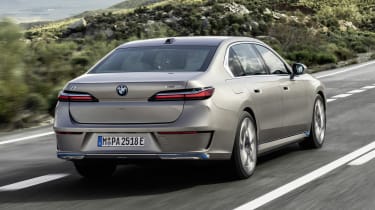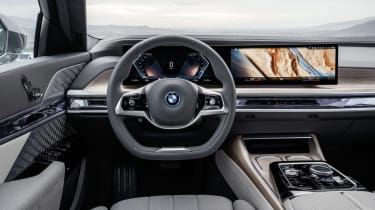New 2022 BMW 7 Series and electric i7 revealed
The new BMW 7 Series flagship debuts with the i7 xDrive60 EV
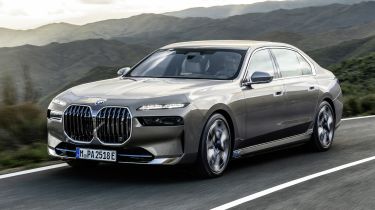
- Electric i7 will be sold alongside the next-generation 7 Series
- i7 promises up to 388 miles
- Large illuminated front grilles
The new BMW 7 Series has finally been unveiled, after plenty of teasers, spy shots and rumours. Perhaps the biggest news is that this generation of 7 Series will welcome a fully electric variant for the first time, alongside plug-in hybrid and standard petrol and diesel engines.
Somewhat surprisingly, the electric BMW i7 will be the first version to go on sale. Badged the i7 xDrive60, it starts from £107,400 and features all the gadgetry you’d expect from its price. The first customers will take delivery at the end of this year. Next spring, the i7 will be joined by less expensive 7 Series plug-in hybrid models.
Both cars will act as direct rivals for other luxury flagships such as the electric Mercedes EQS, Porsche Taycan and Tesla Model S, as well as the combustion-engined Audi A8 and Mercedes S-Class.
2022 BMW i7 range and performance
Featuring a 101.7kWh battery, the BMW i7 offers between 367 and 388 miles of range on a full charge, with efficiency of up to 18.4kWh per 62 miles. The i7 can hook up to an 11kW AC charger (a home or office wallbox) or a 195kW DC public fast-charger, and doing the latter adds around 100 miles of range in just 10 minutes.
With two electric motors providing 536bhp and an even bigger torque figure, the i7 xDrive60 can sprint from 0-62mph in 4.7 seconds. The top speed is 149mph. We’re told that the battery is very slim, being just 11cm tall, so it shouldn’t affect interior space.
An i7 M70 version is on the way, sitting above the regular car like BMW’s other M cars do. This is set to boast 651bhp, and we’ll get more details in time.
BMW 7 Series plug-in hybrids and engines
A few months after the i7 starts appearing on our roads, two plug-in hybrid models will join the range for UK buyers. The 750e xDrive and M760e xDrive both have a 197bhp motor, a new eight-speed automatic gearbox, four-wheel drive and an 18.7kWh battery, but the difference comes in the amount of power produced from the six-cylinder petrol engine. You get 486bhp in the 750e and 563bhp in the M-badged version. We expect they will be very quick off the line - BMW is yet to release performance figures - and both will manage up to 50 miles on electric power alone.
The platform that underpins the 7 Series is built for electric, hybrid and normal petrol and diesel engines, and other countries will get six-cylinder petrol and diesel engines as well as a V8 petrol. However, none of these engines are expected to come to the UK.
An all-wheel steering system allows the rear wheels to turn up to 3.5 degrees, either to match the direction of the front wheels to make the car more stable at higher speeds, or in the opposite direction to make the car more manoeuvrable around town. There’s an active anti-roll function, while independent air suspension is standard as well; this can adjust the ride height by up to 30mm.
Like the recently facelifted BMW X7, the new 7 Series gets a split headlight design and the option of illuminated kidney grilles. There will also be slim LED headlights with crystal technology available. Underneath the grille sits a nearly full-width air intake. The i7 is marked out by blue touches and aerodynamic alloy wheels.
Buyers of the new BMW 7 Series and BMW i7 will be able to specify a 31-inch Theatre Screen system for rear-seat occupants, which appears to hang from the roof like a television. The interior looks similar to the iX, with quite a minimalist design, plus there could be the option to add distinctive artwork to the dashboard like in a Rolls-Royce - a company owned by BMW.
As BMW’s flagship saloons, both the 7 Series and i7 are full of the manufacturer’s latest technology. One of the main focus areas is autonomous driving, and the i7 features enough gadgetry to be able to drive itself for long periods of time, where legal.
BMW 7 Series prototype drive by Sean Carson
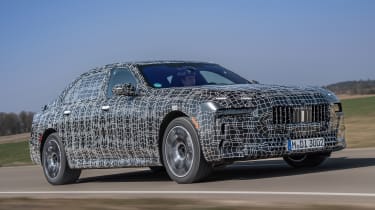
The 7 Series has long been the flagship of the BMW range and while its luxury price tag makes it unattainable for most buyers, it remains incredibly important as each new car sets a standard for the rest of the brand’s lineup.
This latest-generation 7 Series represents the on-going shift into a new age as all models feature at least some form of electrification, whether that be mild-hybrid, plug-in hybrid or the fully electric model that’ll be dubbed the BMW i7.
We got to drive two prototype versions: one an eight-cylinder mild-hybrid petrol, and the other the electric i7, to see whether BMW has managed to reinvent the iconic limousine in a way that looks to the future while also not forgetting the brand’s history of building cars that are luxurious and great to drive.
Kicking things off with the i7, this is the first model to receive this nameplate and is likely to be offered in three different versions that are set to bring varying levels of power and range. The mid-range model that we drove - likely to be badged the i7 xDrive60 - used an electric motor on each axle to give it four-wheel-drive and predicted a range of just under 300 miles from 98% charge. Looking at the recorded consumption figure of 1.77 miles per kWh, we can estimate that this model will use a hefty 120kWh battery and will offer a claimed range of over 400 miles when not driven as exuberantly as we did during our test. It will also be available with 195kW charging - allowing for a 10-80% top-up in around half an hour.
Of course, being an electric car, the i7 was virtually silent out on the road which further added to the cosseting nature of this flagship limousine. Yet, a simple tap of the accelerator pedal was a quick reminder of the mountain of power available from the electric motor. If that wasn’t enough, the Boost mode adds an extra bit of grunt for around 10 seconds, perfect for making a swift overtake on the motorway.
On the other hand, the muscular eight-cylinder mild-hybrid almost appeared coarse in comparison. Although the inherent rumble of the engine under acceleration sounded good and it delivered power smoothly, the added noise and interruption between gear shifts from the automatic gearbox meant the petrol-powered 7 Series felt less seamless than its electric sibling. Plus, while its engine braking function is one of the best on the market, it can’t quite match the one-pedal regenerative braking ability of the i7 which simultaneously enhances efficiency as well as driver comfort.
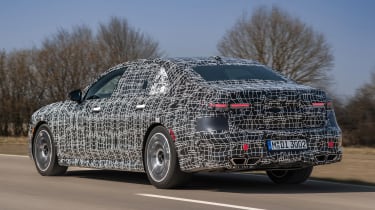
Despite all the mechanical changes for this new model, the 7 Series maintains its ability to be both a comfortable cruiser and a competent sports car all in one package. The 7 Series’ new adaptive air suspension and anti-roll control allows the car to waft down the road and iron out any bumps that may disturb any chauffeured executive.
However, flick the drive mode selector into ‘Sport’ mode and the dampers tense up slightly to provide sharper handling. This is bolstered by a rear-axle steering system which makes the 7 Series feel more direct at low speeds and stable on the motorway.
As is typical for a flagship saloon such as this, the new BMW 7 Series and i7 both showcase some of the brand’s latest technology. Both cars will be available with Level 3 autonomous driving technology which should allow for full hands-free driving at speeds of up-to 37mph - although this is likely to be an expensive option.
The new cars will also debut BMW’s updated Parking Assistant Pro pack as a paid over-the-air update after launch. This will be able to identify designated parking spaces, rather than just gaps between vehicles. The car will also ‘remember’ up to 10 different tricky manoeuvres such as pulling out of a tight driveway, and will be able to execute them autonomously.
As for interior technology, most of the car’s cabin was camouflaged for the prototype drive. However a sneaky peek underneath the covering revealed a curved iDrive instrument panel, similar to that found on the BMW iX. As mentioned, the 7 Series can also feature a new drop-down 31-inch ‘Theatre Screen’ for the rear passengers - the largest of its kind fitted to a production car.
Verdict:
Our first drive in the new BMW 7 Series truly does feel like a modern interpretation of an old-fashioned luxury limousine. While the mild-hybrid model is impressive, the electric i7 steals the show with its unrivalled smoothness and proves that the iX’s success was not just a fluke. Comfortable, powerful and full of tech, the i7 is ready to take the fight to the Mercedes EQS and Tesla Model S.
Recommended

New Subaru Trailseeker revealed as rugged electric SUV with 375bhp

New Subaru Solterra brings more range, power and polish
Most Popular

Omoda E5 targets rivals: now with zero deposit and APR
Tips & advice

Car dashboard warning lights: what does each symbol mean?

Electric car charging stations: public networks, charger types, apps and maps



